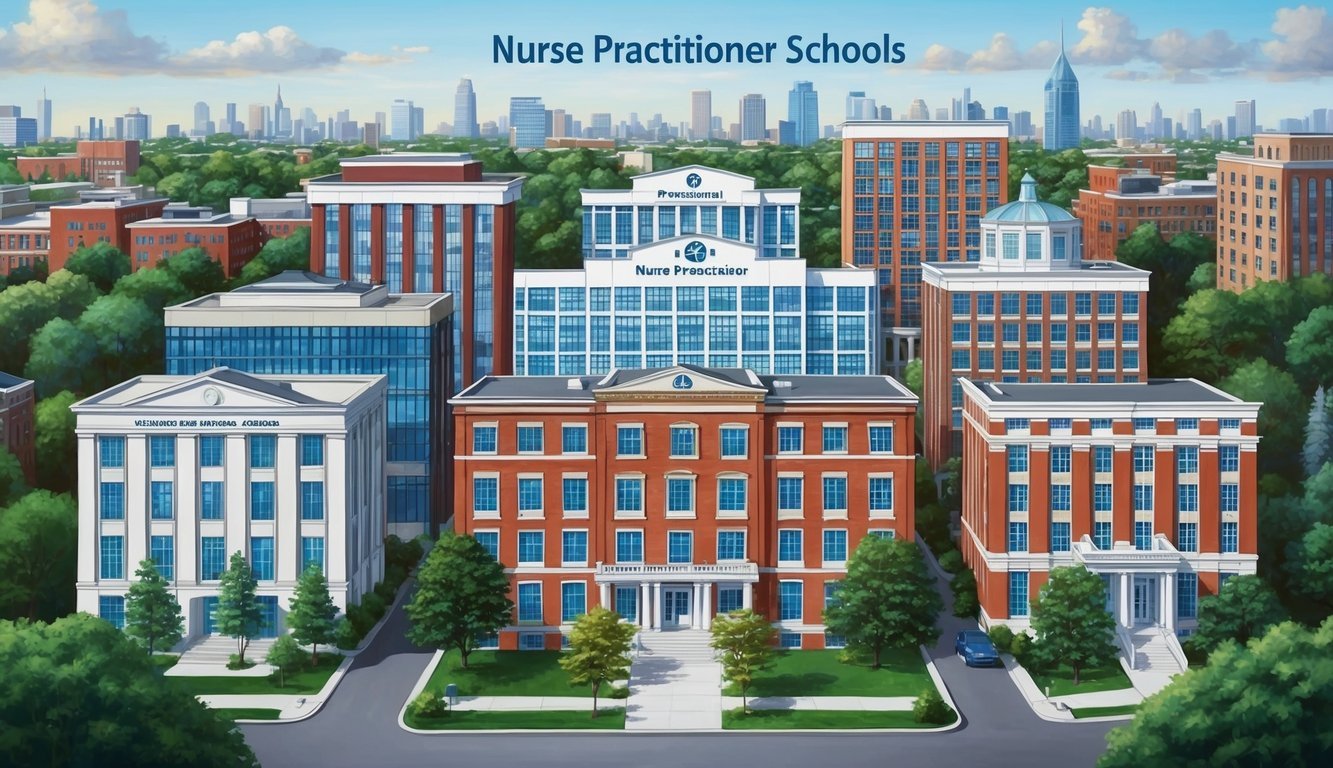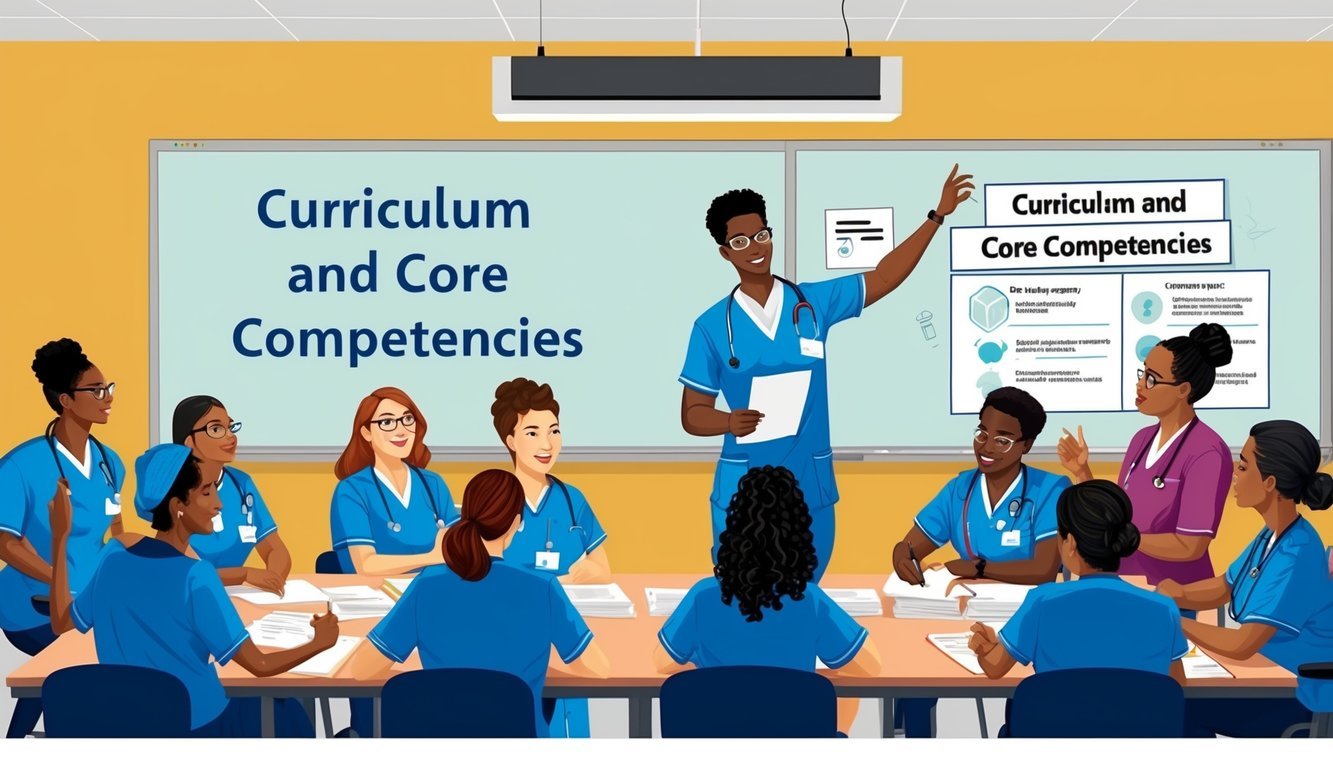Finding the right nurse practitioner school can significantly impact your career in healthcare.
Nurse practitioner schools near you offer a variety of programs tailored to meet different needs and career goals, making it essential to explore your options.
With diverse formats, including online and hybrid models, you can pursue your education while balancing other commitments.
As you consider your path to becoming a nurse practitioner, it’s important to research accredited programs that provide comprehensive curricula.
Look for schools that emphasize core competencies required for advanced practice roles.
By doing so, you can ensure you receive the necessary skills to thrive in your career as an NP.
Key Takeaways
- Explore various nurse practitioner programs to find the best fit for you.
- Focus on accredited schools that offer strong curricula and support.
- Consider program formats and financial aspects before enrolling.
Understanding Nurse Practitioner Programs

Nurse Practitioner (NP) programs prepare you for advanced nursing roles with various specialties.
You will learn about degrees, certifications, and the different fields you can pursue.
This knowledge will help you choose the right path for your career.
Degrees and Certifications
To become a Nurse Practitioner, you typically start with a nursing degree, such as a Bachelor of Science in Nursing (BSN).
After earning your BSN, you can pursue a Master of Science in Nursing (MSN) or a Doctor of Nursing Practice (DNP).
The DNP program is now becoming the standard for advanced practice, emphasizing clinical leadership.
Here are common degrees available for NP programs:
| Degree Type | Description |
|---|---|
| BSN | Entry-level nursing degree |
| MSN | Advanced degree focusing on specialized care |
| DNP | Doctorate focusing on clinical practice |
Certification is essential for practice.
After completing your degree, you need to pass an NP certification exam.
Organizations like the American Association of Nurse Practitioners (AANP) offer certification options to validate your skills.
NP Specialties and Population Focus
As a Nurse Practitioner, you can specialize in various areas based on your interests and the population you want to serve.
Some popular NP specialties include:
- Family Nurse Practitioner (FNP): Focuses on caring for patients of all ages.
- Pediatric Nurse Practitioner (PNP): Works specifically with children and adolescents.
- Adult-Gerontology Nurse Practitioner (AGNP): Cares for adults from young to elderly.
- Psychiatric-Mental Health Nurse Practitioner (PMHNP): Specializes in mental health care.
Choosing a specialty helps define your career path and the types of patients you will serve.
Each specialty may require specific NP programs and certification processes.
Knowing your options is crucial for your professional growth and success.
The Path to Becoming a Nurse Practitioner

Becoming a nurse practitioner (NP) involves specific educational steps and clinical training.
You will need to meet certain prerequisites and gain practical experience in the field.
Below are the key components to help you navigate this path successfully.
Educational Prerequisites and Admissions
To start your journey, you must first become a registered nurse (RN).
This usually requires earning a Bachelor of Science in Nursing (BSN) degree.
Once you are an RN, you can apply to nurse practitioner programs, including RN to NP options, which allow you to advance your education without returning to square one.
Most NP programs require you to complete several prerequisite courses.
These may include subjects like anatomy, physiology, and microbiology.
It’s essential to check each program’s specific admissions criteria.
For a detailed list of programs across the country, explore comprehensive resources like Nurse.org.
Clinical Training and Experience
As part of your training, you will undertake clinical practice experiences.
This training typically includes working under a licensed NP or physician in a clinical preceptorship.
These hands-on opportunities let you learn how to diagnose and treat illnesses while managing chronic health problems.
NP programs often include a significant number of clinical hours—usually around 500 to 1,000 hours.
You’ll also learn about health maintenance strategies, ensuring you are equipped to provide high-quality patient care.
Engaging in various clinical settings helps you gain a broader understanding of patient needs and practice environments.
Program Formats and Considerations

When exploring nurse practitioner schools, choosing the right program format and enrollment type is essential to your NP journey.
You must decide between online or on-campus programs and whether to enroll full-time or part-time.
Each choice has unique benefits and challenges that can impact your education and career.
Online vs. On-Campus Programs
Online nurse practitioner programs offer flexibility, allowing you to study from home.
This format is ideal for those who are working or have other commitments.
Many accredited nursing school programs provide the same quality education as traditional on-campus options.
Some online programs include hands-on clinical training that you complete locally, making it easier to fit into your schedule.
On-campus programs often provide more direct access to faculty and networking opportunities.
You’ll work closely with classmates and have hands-on experience in labs.
However, these programs may require a more rigid schedule.
Consider your personal preferences, learning style, and commitments before choosing.
Full-Time versus Part-Time Enrollment
Deciding between full-time and part-time enrollment can significantly affect your learning journey.
Full-time enrollment typically accelerates your education, allowing you to complete the program faster.
This choice is suitable if you can dedicate most of your time to your studies and clinical placements.
On the other hand, part-time enrollment offers a more manageable pace.
This format is beneficial if you’re balancing work, family, or other responsibilities.
Keep in mind that part-time students may take longer to complete their degree.
Evaluate your current commitments and career goals to find the best fit for you.
Curriculum and Core Competencies

Understanding the curriculum and core competencies in nurse practitioner programs is essential for your education.
These programs offer a range of courses and specializations designed to prepare you for various roles in healthcare.
Core Courses and Advanced Practice
Core courses in nurse practitioner programs focus on essential nursing skills and knowledge necessary for advanced practice.
Key subjects include:
- Pathophysiology: You will study the processes of disease to better understand patient conditions.
- Advanced Pharmacology: This course covers medication management, including prescription practices and potential side effects.
- Physical Assessment: You’ll learn to conduct thorough exams to evaluate patient health.
- Quality Improvement: You will explore methods to enhance patient care and healthcare systems.
These courses prepare you for clinical environments and ensure you meet the competencies required for effective patient care.
You can find programs such as the one offered by LSU Health Sciences Center that emphasizes these core areas.
Nursing Specializations and Electives
Nurse practitioner programs also offer various specialties and electives to enhance your expertise.
You might choose from areas like:
- Adult Gerontology: Focused on healthcare for adults, especially the elderly.
- Pediatric Care: Concentrating on the treatment of infants, children, and adolescents.
- Family Practice: Training to provide comprehensive care across all ages.
Electives allow you to explore topics that interest you, which can be beneficial for your career.
Programs may follow guidelines from the Population-Focused Nurse Practitioner Competencies to ensure you are prepared for diverse patient populations.
Financial Considerations for Prospective Students

As you plan to pursue a career in nurse practitioner (NP) school, understanding the financial aspects is essential.
Tuition costs can vary significantly, and exploring funding options is crucial to managing your expenses effectively.
Tuition and Cost of Attendance
The cost for nurse practitioner programs can range greatly.
On average, you might spend between $50,000 and $60,000 for your entire education, which includes tuition, fees, and living expenses.
Here is a simplified breakdown of potential costs:
| Expense Category | Estimated Cost |
|---|---|
| Tuition | $20,000 – $100,000 |
| Books and Supplies | $1,000 – $2,000 |
| Housing (per year) | $10,000 – $20,000 |
| Miscellaneous Living Expenses | $5,000 – $10,000 |
Consider that programs leading to a Doctor of Nursing Practice (DNP) may have higher tuition than traditional master’s programs.
Scholarships, Grants, and Financial Aid
Many options exist to help offset your education costs.
Scholarships and grants are often awarded based on need or merit.
The American Academy of Nurse Practitioners has resources for scholarships that can significantly lower your expenses.
You may also want to explore federal financial aid programs.
Here are types of aid that can assist:
- Federal loans: Available to most students, they often have lower interest rates.
- Grants: These do not need to be repaid and are typically based on financial need.
- Private scholarships: Some organizations offer financial assistance aimed at NP students.
Make sure to complete the FAFSA to determine your eligibility for various financial aid programs.
Consider searching for opportunities specifically tailored to family nurse practitioners (FNP) and other specialty programs.
Frequently Asked Questions
This section addresses common inquiries you may have about nurse practitioner programs, including rankings, requirements, program lengths, and accreditation.
You will find specific information tailored to your needs as you explore options for your nursing career.
What are the top-ranked nurse practitioner programs in New York?
New York boasts several top-ranked nurse practitioner programs.
Institutions such as Columbia University, NYU, and the University of Rochester lead in quality education and clinical training.
Each offers unique specialties and competitive curriculums, which you can review on their respective websites.
What are the requirements to become a nurse practitioner in New York State?
To become a nurse practitioner in New York, you must first earn a Bachelor of Science in Nursing (BSN) degree.
Following that, you will need to complete a master’s or doctoral degree in nursing.
Additionally, you must obtain a Nurse Practitioner (NP) license and pass a national certification exam in your chosen specialty.
How long is the typical duration of nurse practitioner programs?
Most nurse practitioner programs take about 2 to 4 years to complete, depending on whether you pursue full-time or part-time study.
Master’s programs usually last around 2 years, while Doctor of Nursing Practice (DNP) programs may take up to 3 to 4 years.
Are there any accelerated nurse practitioner programs available online?
Yes, several schools offer accelerated online nurse practitioner programs.
These programs enable you to complete your degree faster by taking more courses in a shorter time frame.
Research programs to find options that best fit your schedule and learning style.
What accreditation should I look for in a nurse practitioner school?
Look for programs accredited by agencies such as the Commission on Collegiate Nursing Education (CCNE) or the Accreditation Commission for Education in Nursing (ACEN).
These agencies ensure that the program meets specific educational standards necessary for high-quality nursing education.
How can I find accredited nurse practitioner programs near my location?
You can find accredited nurse practitioner programs by visiting the websites of nursing schools in your area.
Additionally, the American Association of Colleges of Nursing (AACN) offers resources to help you identify accredited programs.
Checking state boards of nursing for approved schools is also beneficial.

